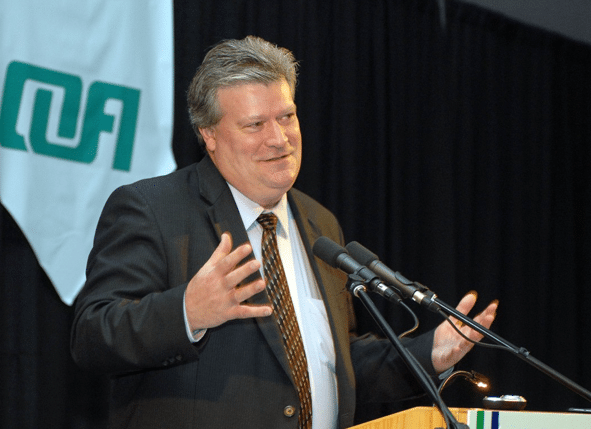The B.C. Tap Water Alliance (BCTWA) called today for the resignation of British Columbia’s Energy Minister Rich Coleman. The demand comes on the heels of a Global TV program 16:9 which on Saturday evening aired Untested Science, an investigation into the recent surge of fracking across BC and Alberta. During the program Minister Coleman is berated by investigators for failing to keep his promise to implement a public consultation process in BC, a province beset by some of the largest fracking operations in the world.
On June 1, 2011, Minister Coleman guaranteed the British Columbian public that
“an extensive process of public consultation” would be put into place to allow the public to comment and become a part of the approval process that determines the gas industry’s reign in the province’s northeastern shale gas plays. Despite this promise, the gas industry has been granted numerous water withdrawal permits since then without any consultation of the public.
As
DeSmogBlog reported at the time, the
BC Oil & Gas Commission had already allotted 78 million cubic meters of water to fracking companies each year, free of charge, before adding an additional 3.65 million cubic meters to that total for
Talisman Energy in July of this year. The water is pumped from
BC’s largest fresh water body, the Williston Reservoir. The company withdrawal permits are valid for 20 years.
According to a press release from the
BCTWA, Talisman and another unconventional gas company,
Canbriam Energy, have nearly completed the 60-kilometer twin water pipeline that connects the Williston Reservoir directly to the Farrell Creek gas play, north of Hudson’s Hope where Talisman alone will frack nearly 1,400 wells.
In BC a single gas pad may host up to 20 gas wells and each can be fracked up to 20 times. Each individual frack job can require more than 4,000 cubic meters of water, according to the BCTWA, the equivalent of 4 million liters of water, or about one-and-a-half Olympic sized swimming pools.
In order to retrieve the gas trapped within shale deposits, companies must mix the fresh water with tens of thousands of gallons of
highly toxic chemicals which pose a serious threat to other sources of surface and underground water.
The
BC government’s abysmal lack of oversight has earned the province an industry-friendly reputation. According to
Alberta Oil Magazine, “it’s not just geology that has smiled on northeastern B.C.’s shale plays – government policies have as well.”
As the magazine describes it, the province’s land tenure, leasing and royalty systems all work together for the industry’s good. The generous royalty program in BC, most notably, by allowing companies to pay their royalties in kind by building roads and infrastructure…to new industry gas and pipeline projects.
But BC’s poor record of public consultation, combined with its anemic oversight structure, is starting to anger the masses.
The BCTWA press release quotes independent MLA Bob Simpson, one of the voices calling for a provincial investigation into the process, saying,
“Despite the Minister’s promise, the Oil & Gas Commission approved the pipeline without consulting the public and before the water licenses were even approved. The this week a water license was approved without any notification to the public, let alone holding ‘extensive’ consultations and discussions.”
Instances such as the Williston Reservoir pipeline demonstrate the “complete absence of public policy guiding BC’s natural gas industry,” says the BCTWA.
The press release adds that although Talisman Energy originally agreed to be interviewed by Global TV, the company later refused to participate.
Will Koop, Coordinator of the
BCTWA, is demanding reparations. “Mr. Coleman misled the Speak of the House, the Legislative Assembly and the public in its court of law. The Minister’s misgivings and sorry excuse in
16:9’s interview about granting the 20-year contracts on a topic rife with controversy, amidst growing public awareness without public planning, is utterly inexcusable,” said Koop in the press release.
“Mr. Coleman failed the public. The Premier must not only call for his resignation, but enact our request for a public inquiry and a moratorium on fracking in BC.”
The BCTWA has been at the helm of other meaningful calls for accountability on behalf of the BC government. Let’s hope this time their concerns are more meaningfully heeded.






